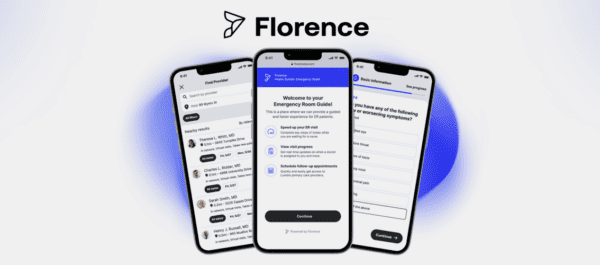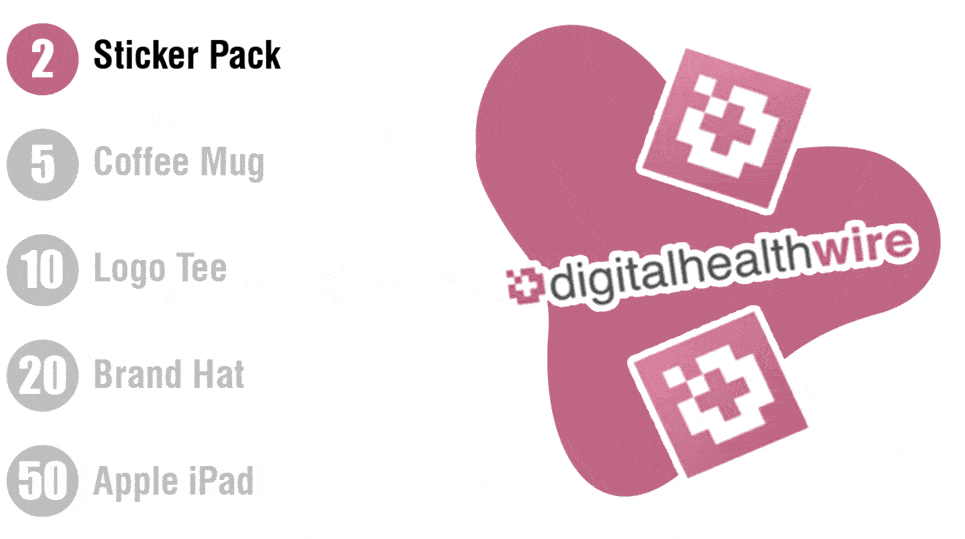|
Florence Acquires Zipnosis | Dock Funding
June 1, 2023
|
|
|

|
|
Together with
|

|
|
|
“There are a lot of great consumer design-led healthcare businesses that are really focusing on the DTC segment, but when it comes to the enterprise side or the in-hospital experience, it still feels like you’re in the 90s.”
|
|
Florence CEO Aniq Rahman
|
|

|
|
Florence isn’t wasting any time putting its $20M seed round to good use, picking up asynchronous telehealth platform Zipnosis off of struggling insurtech Bright Health less than two months after closing the funding.
Florence was founded to unlock clinical capacity by giving patients mobile-first experiences that rival consumer industries, allowing them to update their clinical information, fill prescriptions, initiate self-discharge, and book follow-ups. Here’s our full overview.
- Although Florence initially set its sights on the ED, acquiring Zipnosis broadens its product suite with device-agnostic asynchronous telehealth and immediately allows it to accelerate its roadmap to new sites of care – particularly the home.
- The cherry on top of the acquisition is that Zipnosis also brings 50+ health system customers, giving Florence a solid foot in the door to start offering its core ED services.
For its part, Bright Health acquired Zipnosis for roughly $50M just two years ago as it looked to bulk up its capabilities ahead of an IPO that ended up valuing the company at $11.2 billion.
- As with most high-flying public debuts around that time, Bright… struggled to grow into its valuation. The company has since exited ACA exchanges, begun looking to cut its last two MA markets, and overdrawn a $300M+ line of credit.
- That combo forced Bright to offload business lines like Zipnosis to avoid bankruptcy, and although the financial terms of the acquisition weren’t disclosed, Florence’s entire seed round doesn’t seem like it would put much of a dent in Bright’s problems.
The Takeaway
All-in-all, this looks like textbook execution by Florence. The company had just 70 employees prior to doubling its head count with Zipnosis team members, and acquiring complementary capabilities and an existing customer base was probably a lot more efficient than building them in-house. It’s also safe to say that Bright isn’t the only distressed business looking to trim units, and it’s likely that we’ll see more stories like this one as strategic acquirers scoop them up.
|




|
|
Clear Arch Health Unlocks Turnkey Virtual Care
Clear Arch Health’s turnkey remote patient monitoring and PERS solutions are fully customizable to meet the unique needs of every organization. Discover how Clear Arch Health is helping hospitals, physicians groups, and home health agencies effectively manage patient care – whenever and wherever it’s needed.
|
|
A Flexible Prescription for Nurses
connectRN was founded to give nurses “radical flexibility,” with schedules that are crafted around their lifestyles, priorities, and personal needs. Check out connectRN’s feature in Fast Company to see how the future of healthcare is being built together with nurses.
|
|
The New Standard for Prescription Safety
Synapse Medicine’s quick-deploy Prescription Assistance API and components can be up and running in less than a day and instantly connect your HCPs to real-time drug data and prescribing support. Find out how easy it can be to equip your providers with the tools they need to ensure prescription safety and precision for their patients.
|
|
- Dock Closes $5M: Healthcare administrative hub Dock Health raised $5M in funding to expand its workflow management platform to a more powerful automation and analytics engine that drives administrative best practices. Spun out of Boston Children’s Hospital in 2020, Dock gets clinical and administrative teams on the same dashboard so that they can sync their processes and support their workflows with integrations that ultimately eliminate friction and reduce care delays.
- Smartphones Predict Readmissions: A Nature study found that adding remote patient monitoring data from smartphones or wearables improves standard regression models for predicting 30-day readmissions. The enhanced prediction model with both physical activity and sleep pattern data increased AUCs from 0.63 to >0.80, with data from just wearables only slightly outperforming smartphone data in the best models (AUCs: 0.85 vs 0.84). The researchers concluded that smartphones hold potential as one of the most scalable ways to improve readmission predictions.
- DiMe Analytical Validation Library: DiMe rolled out another great public resource with its Analytical Validation Library that lets digital health stakeholders browse high-quality studies related to algorithms converting sensor data into measures that are fine-tuned for clinical decision making and reliable across entire populations (e.g. ensuring RPM tech is correct enough to manage conditions remotely, or pulse-ox works well across all skin tones). The AV Library only includes vetted examples across a wide range of use cases to help users implement best practices in their own products.
- No-COVID Summer Mentality: An Axios-Ipsos survey fielded following the end of the public health emergency in May found that Americans are ready to put COVID in their rearview mirror before summer, with 62% agreeing that the pandemic is over (vs. 46% in February). Although the virus is still circulating, only 24% of respondents now believe that contracting COVID poses a large or moderate health risk (down from 33% in Feb.). COVID now ranks 5th among Americans’ top health concerns (6%), behind opioids (26%), obesity (21%), firearms (17%), and cancer (12%).
- Carrum Series B: Carrum Health closed a $45M Series B round (total funding now $96M) to develop its digital marketplace for employers in search of specialty care. The funding was specifically earmarked to expand Carrum’s oncology and surgical care benefits to give employees access to the top 10% of doctors while helping employers control costs. Utilizing a Centers of Excellence network, Carrum members receive treatment guidance and coordination with aligned incentives that reportedly reduce employer costs up to 45% per episode of care.
- Gillette Deploys Notable: Gillette Children’s is implementing Notable’s intelligent automation platform to streamline and personalize the registration experience for the system’s 26k pediatric patients. Notable will help Gillette Children’s automate scheduling, pre-visit registration, appointment reminders, and clinical intake forms – with the health system reportedly opting for Notable due to its ability to manage the intricacies of its complex patient population, primarily children with brain, bone, and movement conditions.
- Elevance Whole Person Health Index: Elevance Health leadership pulled back the curtain on its Whole Health Index in NEJM Catalyst, providing insight into the 93 social, physical, and behavioral measures that the company uses to improve health both at the individual and population levels. It’s interesting to see the logic behind the most important metric at one of the nation’s top payors, including the variation in scores by county and the weights that Elevance assigns to Social Drivers (50%), Global Health / Disease Burden (30%), and Clinical Quality (20%).
- PaceMate & AliveCor’s RPM Partnership: PaceMate and AliveCor announced the integration of the PaceMateLIVE remote patient monitoring platform with AliveCor’s KardiaPro remote ECG devices. With the integration, healthcare providers can use PaceMateLIVE to access and analyze heart rhythm data from patients who are monitored with AliveCor’s consumer ECG products, alongside other monitoring device data that PaceMate also supports (event monitoring, heart failure, implantable cardiac devices, weight, blood pressure).
- Mental Health Brightspot in Healthcare M&A: The latest Healthcare M&A Report from the Braff Group shows that we’re probably in for another down year, with Q1 2023’s annualized mergers and acquisitions volume pacing a 32% drop from 2022. Home Health, Hospice, Pharmacy, and Staffing deals have seen the most contraction, while Mental Health continues to outperform with 17 transactions in Q1 alone. The report specifically calls out the Autism segment’s “remarkable resiliency” despite ABA exiting 10 states and Elemy shuttering its care delivery business.
- Vascular Care’s Wild West: ProPublica exposed the “Wild West” of outpatient vascular care, noting how CMS efforts to drive non-invasive and non-hospital vascular procedures also drove a surge in unnecessary and dangerous outpatient care. The article revealed that atherectomy volumes doubled and physician payments tripled between 2013 and 2021, with the top 5% of physicians (just 90 doctors) accounting for more than one third of U.S. atherectomies and nearly $1B in payments. If those numbers aren’t scary enough, the article detailed a long list of unnecessary care horror stories.
- Tomorrow Health Refocuses Operations: Tomorrow Health is shutting down its first-party home medical equipment (HME) supply business to focus on enabling home-based care through its network health plan and provider partners. When we covered Tomorrow Health’s $60M Series B in July of last year, the company was focused on intelligently matching patients with suppliers in addition to its first-party HME service, and it’s now going the software-only route to bring its operational efficiency tech to HME partners such as Apria, AdaptHealth, and Home Care Delivered.
|
|
Clinical Documentation Integrity For VBC
The growing use of risk-adjusted reimbursement in outpatient settings means clinical documentation needs to keep up, or health systems risk leaving revenue on the table. Check out Nuance’s new blog to learn how shifting reimbursement models make clinical documentation excellence more important than ever, and how AI can help you achieve it.
|
|
Glooko Outcomes Using Real-World Data
Modern diabetes management requires personalized, always-on, and connected care. Explore Glooko’s latest clinical studies to see how remote patient monitoring is making real-word improvements across multiple glycemic outcomes.
|
|
4 Tips for Licensing Your Telehealth Providers
Telemedicine is the next frontier of care delivery, yet many providers continue to be hampered by the complex process of medical licensing. If you’re one of them, check out Medallion’s four tips for licensing your telehealth providers.
|
|
|
Share Digital Health Wire
|
|
Spread the news & help us grow ⚡
|
|
Refer colleagues with your unique link and earn rewards.
|

|
|
|
|
Or copy and share your custom referral link: *|SHAREURL|*
|
|
You currently have *|REFERRALS|* referrals.
|
|
|
|
|